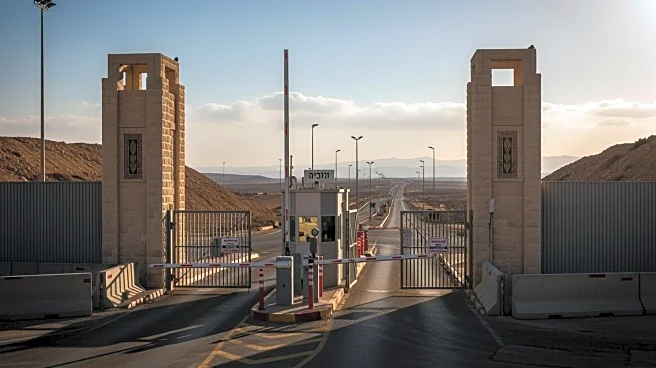What's Happening?
Israel's military aid agency, COGAT, announced ongoing preparations with Egypt to open the Rafah border crossing with Gaza for the movement of people. The exact date for the opening has not been disclosed.
This development follows Israel's previous warnings about potentially keeping Rafah closed and reducing aid to Gaza due to Hamas's slow return of the bodies of deceased hostages. The situation underscores the fragile nature of the cease-fire that ended two years of conflict, during which all living hostages held by Hamas were released. Humanitarian aid continues to enter Gaza through the Kerem Shalom crossing with Israel, but COGAT emphasized that such aid will not pass through Rafah, as this was never part of the agreement.
Why It's Important?
The opening of the Rafah border crossing is significant as it could ease movement for people in and out of Gaza, potentially alleviating some humanitarian pressures. However, the ongoing tensions between Israel and Hamas pose risks to the stability of the cease-fire and the broader peace efforts in the region. The slow return of hostages' bodies by Hamas has been a point of contention, affecting diplomatic relations and aid negotiations. The situation impacts regional security and the humanitarian conditions in Gaza, influencing international diplomatic efforts and the policies of neighboring countries like Egypt.
What's Next?
The next steps involve finalizing the preparations for the Rafah crossing's opening, with potential diplomatic negotiations to ensure smooth operations. Stakeholders, including international humanitarian organizations, may increase pressure on both Israel and Hamas to adhere to agreements and facilitate aid distribution. The geopolitical dynamics in the region could shift depending on the success or failure of these efforts, affecting future peace negotiations and regional alliances.
Beyond the Headlines
The situation highlights the complex interplay of humanitarian needs and political strategies in conflict zones. The ethical implications of using aid and border access as leverage in political negotiations are significant, raising questions about the responsibilities of international actors in conflict resolution. Long-term, the opening of Rafah could influence migration patterns and economic activities in Gaza, potentially altering the socio-economic landscape.









